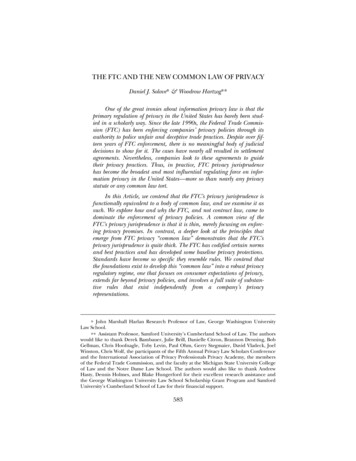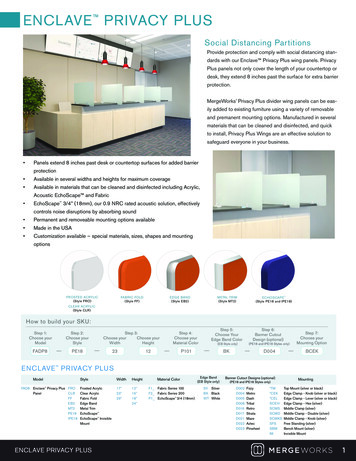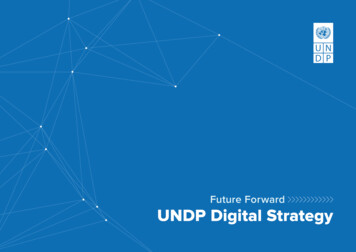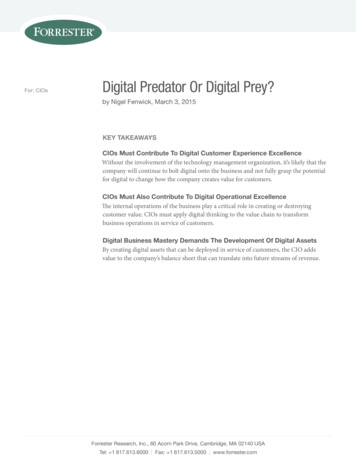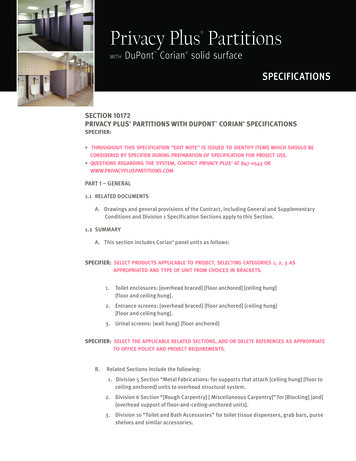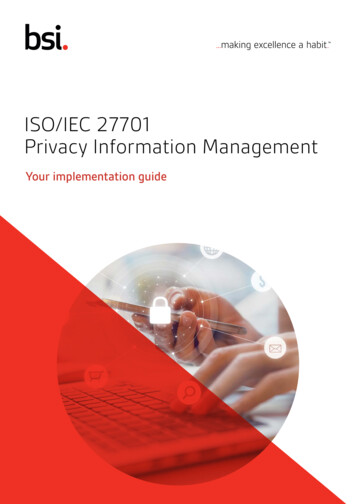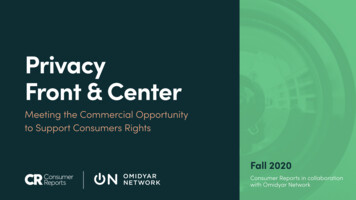
Transcription
PrivacyFront & CenterMeeting the Commercial Opportunityto Support Consumers RightsFall 2020Consumer Reports in collaborationwith Omidyar Network
ContentsAuthors &Acknowledgements03Section 1: Introduction14Section 2: The Evolution of Consumer AttitudesAround Data Privacy34Section 3: Consumer Attitudes Today51Section 4: Quantifying Consumer Preference61Section 5: Moving Toward a Market for Privacy67Appendix & Further ReadingThis report was authored by Benjamin Moskowitz, Stephanie Nguyen, Michael Cohen, and GinnyFahs. It is based on a literature review conducted by Justin Brookman and Katie McInnis; surveyresearch and data analysis conducted by Kristen Purcell, Karen Jaffe, Debra Kalensky, Charu Ahuja,Monica Liriano, Michael Saccucci, Dina Haner, Kristen Dorrell, Nish Suvarnakar, Dirk Klingner andAmit Bhan. Thanks to Magdi Amin, Geoffrey MacDougall, Jesús Salas, Sarah Drinkwater, ShannonMiller, Elizabeth M. Renieris, and others for feedback and contributions to this report.2
SECTION 1Introduction3
Privacy is what happens behind the scenespri va cy 'prīvese enounthe state of being free from public attention4
So it’s natural that companies handle privacy privatelyPrivacy features are nottypically marketedPrivacy tactics areusually kept secretCompanies say theycare about privacy.butwhat does this mean?5
It can be hard to know which companies reallywalk the walk when it comes to privacy.6
Yet the evidence shows that consumersincreasingly care about their privacy.And when companies compete on things thatconsumers care about — whether price, features,safety, or privacy — everyone wins.7
This is what drives us at Consumer ReportsWe exist to drive better outcomes for consumers by ensuring a fair,just, and high-functioning marketplace.In a high-functioning marketplace, companies compete to winconsumers along dimensions like price, performance, and features.We’ve been helping consumers choose on this basis since 1936.8
Consumers increasingly demand that their productsare private, secure, and treat them fairlySo Consumer Reports andOmidyar Network teamedup to examine evolvingconsumer attitudes towardprivacy and quantifyprivacy’s market impact.9
Benefits exist for companies who compete anddifferentiate on privacyHistorically, privacy has been seen as a liability.Focusing on privacy means limiting downside risk.However, evidence suggests that technology companies focused onprivacy and security will see significant upside.The upside comes from higher regard for brand andhigher willingness to pay.10
A word about“willingness to pay”Our goal is not to turn the right of privacy into a luxury good outof reach, but rather to harness competitive dynamics to raiseprivacy and data security standards.However, we are interested in whether differentiation could be anopportunity for first-movers to capture market share or increaseshort-term willingness to pay.Over time, we expect many privacy and data security featuresto become “table stakes” in which case first movers will innovateand raise standards further.11
Companies can useThe Digital Standard toimplement privacy inproduct and service design,among other valuesThe Standard is A rubric articulating best practicesin security, privacy, ownership, andgovernance An open source consensus reflecting expertviewpoints A way companies can prove theircommitment to consumer values A roadmap to more secure products andhigher favor with consumers12
The evidence suggests real business impact whencompanies put privacy front and centerTrends are clear when we look at:The history of consumertrends and demand forprivacy and data securityHow and when privacy andsecurity inform consumers’purchasing behaviorHow much consumers saythey’re willing to pay forbetter protection13
SECTION 2The evolution ofconsumer attitudesaround data privacy14
“Some have concluded that our society, quite simply,does not place much value on privacy.”(Rubin and Lenard 2002)Has less privacy truly becomethe new social norm over time?15
Consumers’ privacy preferences are commonly misunderstoodMISCONCEPTION 1MISCONCEPTION 2“Consumers don’t really care about privacy;the benefits of sharing & personalizationoutweigh the risks.”“Consumers say they care about privacy, buttheir actual behaviors suggest privacy doesn’tmatter very much.”Privacy is not the opposite of sharing personal information; rather, itis control over sharing.Privacy is highly contextual and involves a complex set of trade-offsthat can mix tangible, intangible, and abstract qualities.There are real benefits to sharing data, but consumers consistentlyreport feeling a lack of agency and control over their data.Privacy attitudes and privacy behavior are grouped too often.According to a recent Pew survey, just 9% of people believe they have “a lot of control” over the informationthat is collected about them, even as 74% say “it is very important to be in control.”These misconceptions conceal significant opportunities for companiesto better meet consumers’ values and preferences.16
CR did a meta analysis to chart trends inpublic attitudes over 25 ious UsersConfident UsersConcerned UsersCritical UsersEarly internet adoptersWider adoptionGrowing awareness oftracking, privacyConsumer awarenessleading to distrust17
In 1995 when the internet was young, consumers were alreadyworried about the impacts of technology on privacyFear of Internet PrivacyLoss in 1995 AmongOnline UsersAlmost half of online users worried “alot” or “some” about loss of privacy.Worry “a lot”12%Don’t worry56%Worry “some”32%Source: Andrew Kohut et al., Technology in the American Household: Americans Going Online.Explosive Growth, Uncertain Destinations, TIMES MIRROR CTR.FOR THE PEOPLE & THE PRESS (Oct. 16, 1995)18
In 1995, a task force convened by PresidentBill Clinton concluded that safeguarding privacywas crucial in the information age“If government and the private sector want to encourage the vigorous consumer activityneeded to unlock the full potential of the information infrastructure, they must acknowledgeand safeguard the legitimate privacy interests of [.] users.”Source: Andrew Kohut et al., Technology in the American Household: Americans Going Online.Explosive Growth, Uncertain Destinations, TIMES MIRROR CTR.FOR THE PEOPLE & THE PRESS (Oct. 16, 1995)19
However, the task force believed that what the U.S. needed was nota comprehensive privacy law, but a voluntary framework Companies disclose information With few exceptions (such Companies honor their ownabout their data practices toas health data) there are nopolicies, which users passivelyconsumers prior to obtainingaffirmative consumer privacyconsent to when they use atheir consent.obligations in federal law.product or service.Source: Anupam Chandler, How Law Made Silicon Valley, 63 EMORY L.J.639, 666 (2014)20
As a result, under U.S. law,responsibility for privacy fallson consumers, not companies.To this day, the U.S. does not have acomprehensive consumer privacy law.Practically it is almost impossible for consumersto fully consent to data collection and usagewhen they cannot keep pace with howadvertisers, data brokers, and edge providerscollect and leverage their data.Source: Consumer Attitudes Toward Online Tracking, 1995-2019, page 421
In the early 2000s, Americans demonstrated a growing awareness oftracking and data sharing and more than half of them were online 49% of consumers knew about cookies as a device foronline tracking in 2002. Knowledge of cookies grew with maturity of internet use. In a 2002 survey, 76% of participants said they wereuncomfortable with a company connecting datafrom internet cookies to email addresses in atargeted email campaign.Knowledge of Cookies Based on Internet UseOnline for3 or more years63%Online for6 months or less23%0%Source: A Matter of Trust: What Users Want from Web Sites, CONSUMER WEBWATCH (a project of Consumer Reports) (Apr. 16, 2002)20%40%60%80%22
Yet they still underestimated the lack of protection for theironline activities, and the potential privacy and security risks94% felt“I have a legal right to knoweverything that a web siteknows about me.”57% believedthat if a company has aprivacy policy, the companywill not share informationwith other entities.Source: Joseph Turow, Americans and Online Privacy: The System is Broken, ANNENBERG SCHOOL OF COMMONS (June 2003)59% did not knowthat websites collectedinformation about themeven without a registrationrequirement on the site.23
By 2008,consumers’knowledge ofonline trackinghad grown again.Consumer Awareness and Attitudes About Behavioral Targeting100%91%75%71%50%64%57%25%0%Aware browsing datacollected by 3rd partiesSource: TRUSTe Report Reveals Consumer Awareness and Attitudes AboutBehavioral Targeting, TRUSTE(Mar. 28, 2008)Not comfortable withtailored ads based onbrowsingWilling to take steps toprotect privacy onlineWant to see ads onlyfrom brands they knowand trust24
.but so had the sophistication of the online data sharing ecosystemSEPTEMBER 2006JULY 2007NOVEMBER 2007MARCH 2008DoubleClick mergerapproved by FTCFacebook News Feed30M Facebook UsersFacebook BeaconThree days after releasing the feature,Facebook introduced privacy controlsin response to public outcry.More than half of all teens aged 12-17had a social media profile.Sent data from external sitesto Facebook for targetingadvertisements66% of them limited access to theirprofile in some way.Earlier in 2007, Facebook hadchanged its privacy policy to allowcollecting information about userswithout their consent. Opt-out was nolonger an option.Search information gathered byGoogle combined with browsinginformation gathered by DoubleClickpaved the way for richer datasources that enabled highly targetedadvertisingSource: Amanda Lenhart & Mary Madden, Social Networking Websites and Teens, PEW RESEARCH CTR.(Jan. 7, 2007); Amanda Lenhart & Mary Madden, Teens, Privacy, and Online Social Networks, PEW RESEARCH CTR.(Apr. 18, 2007); Bernhard Debatin et al.,Facebook and OnlinePrivacy: Attitudes, Behaviors, and Unintended Consequences, 15 J.OF COMPUTER-MEDIATED COMMC’N83, 83–108 (Oct. 2009); Andrew Romano, Facebook’s ‘News Feed’, NEWSWEEK(Sept. 24, 20016; danah boyd, Facebook’s Privacy Trainwreck, 14 CONVERGENCE13, 13-20 (Feb. 1, 2008);Vauhini Vara, Facebook’s Tracking of User Activity Riles Privacy Advocates, Members, WALL ST.J.(Nov. 21, 2007; This org.known as the Digital Trust Foundation - operated from 2014-2019.25
In the early 2010s, consumers saw a darker side of data sharing20102013Julia Angwin revealed numerous ways companies trackand mine information from consumers in her“What They Know” seriesEdward Snowden revelations made U.S. consumersmore worried about being tracked by their government.22% of adults said they had changed their tech usagepatterns either “a great deal” or “somewhat” after theSnowden revelations.Source: What They Know Series, JULIA ANGWIN; Julia Angwin & Tom McGinty, Sites Feed Personal Details to New Tracking Industry, WALL ST.J.(July 30, 2010); Emily Steel & Julia Angwin, On the Web’s Cutting Edge, Anonymity in Name Only, WALL ST.J.; Julia Angwin & Jennifer Valentino-DeVries,Race is on to ‘Fingerprint’ Phones, PCs, WALL ST.J.; What They Know: The Business of Tracking You on the Internet, WALL ST.J.; Public Perceptions of Privacy and Security in the Post-Snowden Era, PEW RESEARCH CTR.(Nov. 12, 2014); Lee Rainie & Mary Madden, Americans’ Privacy Strategies PostSnowden, PEW RESEARCH CTR.26
By 2016–2019, greater consumer awareness of trackinghad spawned significant distrust46%of American consumersbelieve their personalinformation is less secure nowthan it was 5 years ago66%of American consumersdo not trust the government toprotect consumers’ interests65%of American consumerssay they are slightly or not atall confident that personaldata is privateSource: Aaron Smith, Americans and Cybersecurity,PEW RESEARCH CTR.(Jan. 26, 2017); Consumer Voices Survey I, CONSUMER REPORTS RESEARCH (Feb. 16, 2017)27
A slew of data breaches and scandals then further eroded consumers’expectation that their information could be kept safe and privateMARCH 2018MARCH 2018Equifax Data BreachCambridge AnalyticaMarriott Data BreachRevealed to have affected at least 148million Americans.Enabled the harvesting of privateinformation from over 50M Facebookprofiles without user permissionExposed the data of 383M guests,including credit card, passport, email,phone, date of birth, and addressSEPTEMBER 2017Source: Kaya Yurieff, Equifax Data Breach: What You Need to Know, CNN (Sept. 10, 2017); Equifax Data Breach Affected 2.4 Million More Consumers, CONSUMER REPORTS (Mar. 1, 2018); Cybele Weisser, Equifax Data Breach Puts Spotlight on How Credit Agencies Work, CONSUMER REPORTS(Oct. 3, 2017); Matthew Rosenberg, Nicolas Confessore, & Carole Cadwalladr, How Trump Consultants Exploited the Facebook Data of Millions, N.Y.TIMES (Mar. 17, 2018); Andrew Perrin, Americans are Changing Their Relationship with Facebook, PEW RESEARCH CTR. (Sept. 5, 2018); Chris Isidore,Marriott Hasn’t Paid the Price for its Massive Data Breach, CNN (May 10, 2019)28
Regulatory interventions have already begun On January 1, 2020 the nation’s firstcomprehensive commercial privacylaw, the California ConsumerPrivacy Act (CCPA), went into effect. CCPA is overwhelmingly popular,with 88% of California voters infavor and just 5% opposed. Under the CCPA, Californiaconsumers can:- Require that their personal information notbe sold by specific companies- Get a copy of information that specificcompanies have about them- Request the deletion of their personalinformationCCPA is California-specific, but other US statesare working on similar new laws and initiatives.29
Data privacy can feel like an arms race between an increasinglysophisticated consumer and companies trying to stay one step ahead Although consumers have gainedtech literacy over time, they need todo ever more to protect the privacyand the security of their data Ongoing high-profile privacyrevelations contribute to a sense ofconsumer helplessness Consumers remain concernedabout their privacy but lackknowledge or meaningful choicesHalf of consumers believe it’s “part and parcel” of being onlinethat people will try to cheat or harm them in some way.Source: Consumer Attitudes Toward Online Tracking, 1995-2019, page 4, 6. The 2020 Digital Attitudes Report, Doteveryone, Page 3.30
We’re at a criticaljuncture for consumerprivacy in the U.S. Notice and consent has enabled a situation where the privacypractices of many products have drifted far from consumers’preferences. Consumers have believed for decades that they have more rightsand protection online than they do. The techniques to protect user privacy have remained the samesince the late 90s. The majority of consumers today know they are not in control oftheir data. There is a significant gap between consumer understanding oftracking technology & the means to control it.31
Concern about the power of big tech and frustrationfrom privacy scandals are increasing demand forboth regulation and consumer privacy solutions.32
Marketing messages from big tech companies are starting toreflect consumers’ privacy demandsFacebook CEO Mark Zuckerberg touting privacyfeatures at April 2019 developer conference.Source: Consumer Reports commentaryApple iPhone privacy digital and billboardcampaign, January 2019.Google privacy settings print/billboardcampaign, September 2019.33
SECTION 3ConsumerAttitudes Today34
Nearly two thirds of smart product owners worry about loss of privacywhen buying them for their home or family62%OFSMART PRODUCTOWNERSsaid they worry about potential loss ofprivacy when buying smart productsConsumer Reports nationally representative survey of 5,085 adult U.S. residents fielded Feb 7 - 21, 202035
Concern about how much data and about the privacy ofpersonal data companies collect and store about youBase: All respondentsThree quarters ofconsumers are at leastmoderately concernedabout the privacy oftheir personal dataConcern about the PRIVACY of your personaldata that companies collect and store about youConcern about HOW MUCH data companiescollect and store about rnedSlightly/Not at allconcernedConsumer Reports nationally representative survey of5,085 adult U.S. residents fielded Feb 7 - 21, 202033%26%27%36
96% of Americans agree that more should be done to ensure thatcompanies protect the privacy of nies should be required to delete thedata they have about you upon your request.Companies should be required to give youaccess to the data they have about you.67%OFAMERICANSSAY.63%OFAMERICANSSAY.There should be tougher penalties, such ashigh fines, for companies that don’t protectyour privacy.There should be a national law that sayscompanies must get your permissionbefore they share your information.Consumer Reports nationally representative survey of 5,085 adult U.S. residents fielded Feb 7 - 21, 202064%OFAMERICANSSAY.60%OFAMERICANSSAY.Companies should be prohibited from sharingdata with third parties.Companies should be required to be moretransparent about their privacy policies so thatconsumers can make more informed choices.37
More consumersbelieve companiesshould be mostresponsible for userprivacy than believegovernments should.Over three-quarters ofAmerican consumers believeresponsibility for protectingconsumer privacy should notfall to individuals.Consumer Reports nationally representative survey of5,085 adult U.S. residents fielded Feb 7 - 21, 2020Who should be MOST responsible for protectingconsumers’ online privacy?50%40%42%30%32%20%17%10%0%3%CompaniesFed. Govt.IndividualsState Govt.2%Other3%No One1%Unsure38
U.S. Data Breaches by Sector1,6001,4001,200Data breachesare on the rise1,0008006004002000200520062007BusinessSource: Identity Theft Resource 14Government201520162017Financial39
At least 30% ofAmerican consumers,and maybe ashigh as 45% haveexperienced a databreachHave you ever personally experienced a data breach?Unsure15%No55%Yes30%Consumer Reports nationally representative survey of5,085 adult U.S. residents fielded Feb 7 - 21, 202040
Consumers are willing to pay companiesto be more responsibleWould you be willing to pay to use searchengines such as Google, in exchangefor these companies to STOP collecting,sharing, or selling your data?45% of American consumers indicated a potentialwillingness to pay for online privacyConsumer Reports nationally representative survey of 5,085 adult U.S. residents fielded Feb 7 - 21, 2020Unsure16%No39%Yes, definitely7%Yes, depending on cost38%41
Privacy and security present sizable andrapidly growing opportunitiesConsumer focus on privacyand security is rising.Data privacy and securitycan be a point of beneficialproduct differentiation.Benefits may come in theform of pricing power,profitability, market share,goodwill, talent attraction,or others.42
With smartphones,perceived privacy &security factor intoreasons Android usersswitched to an iPhoneAndroid users who have switchedfrom an Apple to an Androidin the past five yearsApple users who have switchedfrom an Android to an Apple inthe past five yearsWanted a phone with better protections for my privacy sothat my data isn’t stored or accessed by anyone but meWanted apps that are better vettedfor security and privacyConsumer Reports nationally representative survey of5,085 adult U.S. residents fielded Feb 7 - 21, 20208%An Apple/Android is safer and has moresecurity features than other phones24%6%18%1%15%43
For those consideringa switch to an iPhonefrom an Android,privacy or securityreasons were cited by4 in 10 Android usersAndroid users who haveconsidered switching to an Apple inthe past five yearsApple users who haveconsidered switching to an Android inthe past five yearsAn Apple/Android is safer and has moresecurity features than other phones26%4%25%Want a phone with better protections for my privacy sothat my data isn’t stored or accessed by anyone but me9%21%Want apps that are better vetted for security and privacy5%Consumer Reports nationally representative survey of5,085 adult U.S. residents fielded Feb 7 - 21, 202044
“Concerned, non-switchers” could be“low-hanging fruit” for conversion to productswith better privacy and securityConsumer Reports nationally representative survey of 5,085 adult U.S. residents fielded Feb 7 - 21, 202045
Just as convenience carries switching power for Apple iPhone users, so too does privacyTop reasons for recently switching type of phoneConvenience/Cost vs. Privacy-Driven ChoicesReasons why Android users have switched to iPhoneReasons why iPhone users have switched to Android 34% say “I want the same phone brand as family and friends” 24% say “An Apple iPhone is safer and has more security features thanother phones” 21% say “The store where I bought it was providing good deals on iPhones” 20% say “I wanted a phone that would be compatible with other devices inmy home” 39% say “I wanted a phone that I felt provided more value for the price” 36% say “I wanted a less expensive phone” 32% say “I wanted a phone with more options for flexibility andcustomization”Base: Apple iPhone users who have switched to an iPhone from anAndroid in the past five yearsBase: Android users who have switched to an Android from an iPhone inthe past five yearsConsumer Reports nationally representative survey of 5,085 adult U.S. residents fielded Feb 7 - 21, 202046
There is also staying power to privacy with Apple iPhone users, just as there is for convenienceTop reasons for not switching type of phoneConvenience vs. Privacy-DrivenReasons why iPhone users have not consideredswitching to AndroidReasons why Android users have not consideredswitching to iPhone 41% say “It’s what I’ve been using for years and don’t want to learn a newoperating system” 37% say “I have other Apple products and apps that are all synced up andit’s too costly, difficult, and time-consuming to start over” 28% say “I like the protections that an iPhone provides for the privacy sothat my data isn’t stored or accessed by anyone but me” 27% say “I just haven’t thought about it. I’m happy with my iPhone” 23% say “I heard that an Apple iPhone is safer and has more securityfeatures than other phones” 37% say “It’s what I’ve been using for years and don’t want to learn a newoperating system” 33% say “I just haven’t thought about it. I’m happy with my Android” 18% say “I have other Android products and apps that are all synced up andit’s too costly, difficult, or time-consuming to start over”Base: Apple iPhone users who have had their iPhone at least five yearsand have not considered switching to an AndroidBase: Android users who have had their Android at least five years andhave not considered switching to an iPhoneConsumer Reports nationally representative survey of 5,085 adult U.S. residents fielded Feb 7 - 21, 202047
Privacy and securityare important factorsin web browser choice,especially on desktop49%It’s the default browser on myphone/desktop/laptop35%32%42%It’s what I’ve always used41%41%21%Why do you typically use yourpreferred browser on each device?Faster than other web browsers28%28%21%SmartphoneThe interface is easier to use than others26%25%LaptopDesktop18%Better than other browsers formaintaining my online security21%24%11%Easy to customize settings to add extralayers of privacy and protection16%15%More privacy tools so there is less datacollection and tracking than otherbrowsersConsumer Reports nationally representative survey of5,085 adult U.S. residents fielded Feb 7 - 21, 20209%13%14%48
The privacy & securityconscious consumer classseems to include more menand people of color.Consumer Reports nationally representative survey of5,085 adult U.S. residents fielded Feb 7 - 21, 2020Gender:We define “more men” as a higherpercentage of males than females.Race/Ethnicity:We define “more people of color” as a higherpercentage of Black, non-Hispanic andHispanic Americans than white, non-Hispanic.49
We asked American Consumers“Would you be willingto pay to use searchengines such as Google,in exchange for thesecompanies to STOPcollecting, sharing, orselling your data?”And we learned: Americans with higher incomes are more likely to say they would considerpaying depending on the cost. A larger percentage of Black, non-Hispanic and Hispanic Americans (11%)than White, non-Hispanic Americans (5%) say they would definitely pay Americans who are “extremely or very concerned” about the privacy of thepersonal data companies collect and store about them are more likely tosay they would pay or would consider paying depending on the cost. A larger percentage of Americans who experienced a data breach (52%)than those who have not (40%) would pay or would consider payingdepending on the cost Americans who say they considered switching their phone type for aprivacy-oriented reason are more likely than those who haven’t to say theyare willing to pay.Consumer Reports nationally representative survey of5,085 adult U.S. residents fielded Feb 7 - 21, 202050
SECTION 4QuantifyingConsumer Preference51
CR conducted a conjoint analysis to help quantify howconsumers value privacy and security in purchasing behaviorConjoint analysis is atechnique to determinehow people value differentattributes (feature, function,benefits) that make up anindividual productor service.Consumer Reportsconducted a conjointanalysis to drill intounderlying consumerpreferences in six productverticals across hardwareand software.The goal was to identifyspecific opportunitieswhere companies mightcompete / differentiate.52
We focused on product categories acrosshardware and softwareVPNsHealth arsWe also selected for product category representation across Health, Security,Entertainment, Technology, and Automobiles.Selection methodology described in Appendix53
1,501 consumers 3%34%21%39%30%28%20%18%Male49%Gen ZMillennialsBaby Boomers0%Ethnicity12% 35KRegionAfrican American13%Asian Other6%18%37% 35K- 49.9K 49.9K- 74.9K 75K Life Stage21%23%Hispanic15%Caucasian66%Gen X10%Young Single23%Older Single19%Young Couple6%Older Couple18%Young Coupled Parent12%Older Coupled Parent15%Single Parent8%54
Each participantreacted to 10hypothetical products.The hypothetical productswere randomly generated anddemonstrated varying productconfigurations based onpre-defined feature levels for: Price Reliability Performance Ease of Use Personalization Privacy Security55
Across all products tested, price had the most impactPrivacy and security had broad impact and were prioritized over other 8107High ImportanceLow ute Impact Scores: These scores are indexed Importance scores. An average impactful scorewould sit at 100, with scores above 100 having greater impact and below 100 having less. Thesescores are representative of importance at an entire feature level.56
Across all categories, customers were willing to pay morefor the better and best privacy features on the marketCustomers also expressed a willingness to pay more for the betterand best security features across all categories.VPNHealth Apps 15 12 9 6 3 0PrivacySecurity 8 7 6 5 4 3 2 1 0Security Cameras 100 80 60 40 20PrivacyIncrease in WTP from Good to BetterSecurity 0PrivacySecurityIncrease in WTP from Better to Best57
Across all categories, customers were willing to pay morefor the better and best privacy features on the marketCustomers also expressed a willingness to pay more for the betterand best security features across all categories.Smart Speakers 80 70 60 50 40 30 20 10 0PrivacySecurityStreaming Services 8 7 6 5 4 3 2 1 0Cars 20,000 15,000 10,000 5,000PrivacyIncrease in WTP from Good to BetterSecurity 0PrivacySecurityIncrease in WTP from Better to Best58
Software offerings showed a higher total opportunity aroundprivacy and security than hardware artSpeakersStreamingServicesCarsPrivacy OpportunitySecurity OpportunityTotal OpportunityPrivacy and Security Opportunity determined based off of increase of WTP at “Best” level in comparison to the maximum price possible. Total opportunity determined by combination of those two metrics.59
In conclusion, Health, Technology, and Security companies thatprioritize consumer privacy and data security shouldsee significant upsideMost consumers base theirchoices on convenience andcost factors, but nearly allremain concerned aboutprivacy and security.There are discernablecustomer classes thatprioritize privacy and datasecurity in their decisions.In four of the six productcategorizes analyzed, privacyand security features hadabove average impact onconsumer decisions.60
SECTION 5Moving Toward aMarket for Privacy61
With current marketdynamics, privacy willcontinue to ascendDEMANDEmpower consumers to makebetter decisions & take actionRULE-MAKINGSpur rulemakers to prioritize therights and interest of consumersSUPPLYInfluence companies to actresponsibly & make better products62
The regulatory tide on consumer privacy is already turningCultural and societalattitudes towards dataprivacy have irreversiblyshifted.100 privacy and datagovernance-related lawsintroduced at state andfederal levels since the2018 California ConsumerPrivacy Act.These laws could ultimatelydisrupt data-drivenbusiness models that relyupon the m
This is what drives us at Consumer Reports 8. So Consumer Reports and Omidyar Network teamed up to examine evolving consumer attitudes toward privacy and quantify privacy’s market impact

